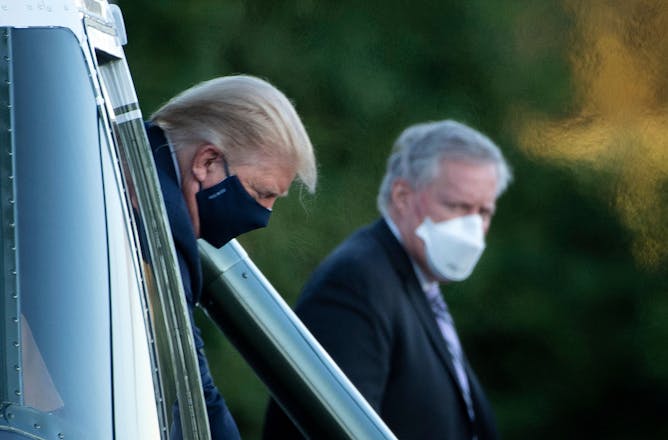|
When the president checks into a hospital suffering from a potentially deadly virus, it’s time to call on the constitutional law scholars.
That’s because the law is clear that if the commander in chief is too ill to carry out his duties, he may transfer power to the vice president. George W. Bush did that when he had to undergo anesthesia for a colonoscopy.
But the law is murkier about what happens if the president may be unable or unwilling to give up power, even if he is clearly too ill to do his job. That situation, writes Stephanie Newbold, a scholar of public administration specializing in constitutional and administrative law at Rutgers University-Newark, poses a potential constitutional crisis.
Also today:
|

President Donald Trump walks off Marine One at Walter Reed Medical Center in Bethesda, Maryland, on October 2, 2020 as White House Chief of Staff Mark Meadows watches.
Brendan Smialowski/AFP via Getty Images
Stephanie Newbold, Rutgers University Newark
A president may transfer power to the vice president if they are no longer capable of carrying out their official role. But there are many unanswered questions about this rarely used process.
|
Science + Technology
|
-
Chelsea Cook, Marquette University
New research suggests individual bees are born with one of two learning styles – either curious or focused. Their genetic tendency has implications for how the hive works together.
-
R. Stanley Williams, Texas A&M University
Artificial brains are far in the future, but computer chips that work like brains could keep computers advancing when today's silicon transistor chips reach their limit.
|
|
Health
|
-
Anna Suk-Fong Lok, University of Michigan
The 2020 Nobel Prize for Physiology or Medicine was awarded for the discovery of the hepatitis C virus. There's an effective cure but homelessness and the opioid epidemic are driving a surge in infections.
|
|
Economy + Business
|
-
Stephanie M.H. Moore, Indiana University
Women suddenly saddled with increased caregiving duties – whether for children or elderly parents – have been forced to reduce their hours, which hurts their careers and lifetime earnings.
-
Kim Williams-Pulfer, IUPUI; Una Osili, IUPUI
From thousands of people chipping in as little as $5 to George Floyd's GoFundMe to donations well in excess of $1 million to HBCUs, anti-racist philanthropy is rising.
|
|
Ethics + Religion
|
-
Phil Zuckerman, Pitzer College
Despite growing numbers of non-religious Americans, self-declared atheists are few and far between in the halls of power – putting the US at odds with other global democracies.
|
|
Environment + Energy
|
-
Char Miller, Pomona College
Conservation or copper? A proposed mine in northern Minnesota pits industrial jobs against a thriving outdoor economy.
-
Michalea King, The Ohio State University
Greenland's glaciers have retreated so far that they can no longer support the ice sheet that feeds them. The ice sheet system has reached a new normal of consistent annual ice loss.
|
|
Politics/Election '20
|
-
David E. Clementson, University of Georgia
President Trump was direct in announcing he had COVID-19. But presidents in the past have been very good at deceiving the public about the state of their health. Which direction will Trump go now?
-
Jennifer Stromer-Galley, Syracuse University
So far, Trump and Biden are spending money on Facebook and Instagram at roughly the same rate as Trump and Hillary Clinton did during 2016.
|
|
Education
|
-
Katherine A. Foss, Middle Tennessee State University
This isn't the first time America's schoolchildren have studied remotely – and Chicago's 1937 'radio school' experiment shows how technology can fill the gap during a crisis.
|
|
Trending on Site
|
-
Brian Geiss, Colorado State University
Older coronavirus patients face grimmer outlooks. A virologist explains the aging-related changes in how immune systems work that are to blame.
-
Chris Lamb, IUPUI
A politician who wields a comeback with skill can use it as both a bludgeon and a shield, damaging the opponent without hurting their own popularity with voters.
-
Curd Knüpfer, Freie Universität Berlin; Robert Mathew Entman, George Washington University
The conservative cable news channel particularly favors the term when explaining opposition to Donald Trump. This framing of the news can lead Fox viewers to see the world as us versus them.
|
|